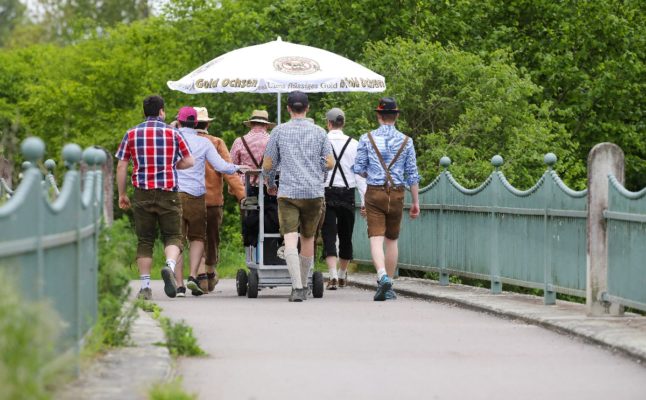An end to Germany’s long contract extensions
We all know the feeling: one day late in cancelling your gym membership and you’re suddenly signed up for another year. Well, that should be a thing of the past soon.
Over the last few months, Germany has been bringing in changes aimed at strengthening consumer rights.
In the latest step, contracts signed from March 1st 2022 will have shorter notice periods. So that means if you sign up to a streaming service, the gym or an electricity provider, for instance, you can get out of the contract more easily.
After the minimum contract period, consumers can cancel their contract with a month’s notice and are not automatically bound for another year. However, this does not apply to insurance contracts so check the terms and conditions there.
Late last year Germany brought in a similar law regarding the automatic renewal of contracts for phones and the Internet.
READ ALSO: How Germany has made it easier to cancel phone and broadband contracts
Covid rules to be relaxed
From March 4th, the 2G-plus regulation in restaurants, bars, cafes and hotels will no longer apply. It means that unvaccinated people will be able to visit a restaurant again with a negative Covid test, under 3G rules. Nightclubs will also be able to reopen from 4 March – under 2G-plus rules, meaning people will need to be vaccinated or recovered with a negative Covid test or a booster shot to enter.
From March 20th, far-reaching Covid restrictions will be dropped, but basic measures will remain in place.
READ ALSO: What you need to know about Germany’s Covid reopening plan

Covid vaccine mandate for employees in health and care
From March 15th, people who work in health or social care will need to be vaccinated or have recovered from Covid. Those who fail to provide proof can face a fine. However, there may be some differences in the implementation depending on the German state.
Better protection for insects
With every passing year, more insects disappear – yet they are indispensable for humans and the ecosystem. Since 2009, about a third of all species have disappeared from meadows and forests in Germany, according to a study by the Technical University of Munich (TUM).
Now under a new law, insect habitats are to be better protected. Meadow orchards and dry stone walls will be recognised as biotopes and the use of insect-damaging biocides like wood preservatives, will be restricted. In nature reserves, new street lighting and illuminated advertising are prohibited.
This is to protect nocturnal insects from light pollution. However, the Nature and Biodiversity Conservation Union (NABU) does not think the law goes far enough to protect insect diversity in Germany. The organisation is calling for a ban on insecticides in bird sanctuaries and a ban on pesticides containing glyphosate earlier than 2024.
Hands off the hedge
From the beginning of March, the annual grace period for hedges begins. To protect breeding birds, hedges in Germany can only be heavily trimmed during the winter months (from October to February). There is a risk of being fined if you do try to chop up the bush or hedge outside your home. However, minor pruning is allowed in spring and summer.
READ ALSO: Why you should cut your hedge in Germany this February
Organ donation
Have you documented your views on organ donation?
A new law which came into force this month aims to make it easier for people to decide and let authorities know whether they want to donate their organs or not. GPs will be able to talk to their patients about organ donation every two years (so your doctor may chat to you about it at your next appointment).
German authorities should also provide information about organ donation, for example when they want to change a driving licence or apply for a new passport.
A nationwide register in which people can state their position for or against organ donation, will go ahead but not this month. It will likely be postponed until the end of the year due to the pandemic, according to the Federal Ministry of Health.
Green licence plate for scooters
The colour of insurance plates for motorcycles changes every year to make it easier to check whether vehicle insurance is up to date. As of March 1st, all mopeds will have to carry a green insurance number plate instead of a blue one.
Vehicles that must carry an insurance plate include mopeds or scooters, light mopeds, Segways or light quad bikes. Anyone still driving around with the previous blue plate may be fined.
Works council elections
From March 1st to May 31st, new employee representatives will be elected in some 28,000 companies in Germany. Keep an ear out for it in your workplace.
Spring arrives (and clocks go forward)
The official beginning of spring season falls on Sunday March 20th (the same day that many Covid restrictions end) and will last until June 21st, when summer begins.
And get ready to lose an hour’s sleep. On March 27th, the clocks will be set forward by one hour from 2am to 3am. Daylight saving time will then remain in effect until the last weekend in October.

Berlin public holiday
People living in the city state of Berlin can enjoy a day off on March 8th for Frauentag (Women’s Day). That falls on a Tuesday – so most people will get a day off for it. The Feiertag, launched in 2019, means Berlin has 10 official holidays. Although this year, sadly, some holidays fall on the weekend.
READ ALSO: How you can make the most of the 2022 public holidays
Eurovision Song Contest
This month we’ll find out who will compete for Germany in the Eurovision Song Contest on May 14th in Turin. German broadcaster NDR unveiled the selection of musical talents and invited the whole country to get involved in the selection process. At 8.15pm on Friday March 4th, viewers will be invited to tune in to Germany 12 Points and viewers at home will be encouraged to vote. Barbara Schöneberger will once again host the show.
ARD pop radio stations are also being given the chance to vote up until Friday.
German pizza birthday
On March 24th, German pizza celebrates its 70th birthday. It all began in 1952 when the first pizza restaurant in Germany, the “Sabbie di Capri”, opened in the old town of Würzburg. Nicolino di Camillo, who died in 2015, came to Bavaria with the American Army from Chieti in Italy and is said to have started the pizzeria with his wife Janine Schmitt.
Anything we missed or something you’d like to know more about? Let us know: [email protected]




 Please whitelist us to continue reading.
Please whitelist us to continue reading.
Member comments